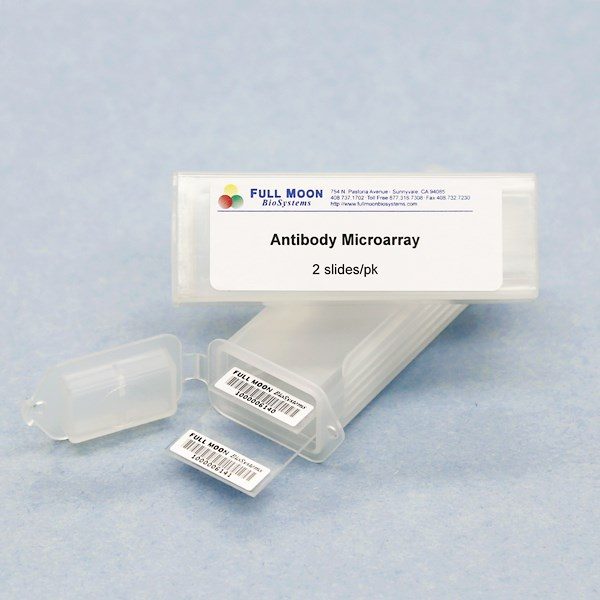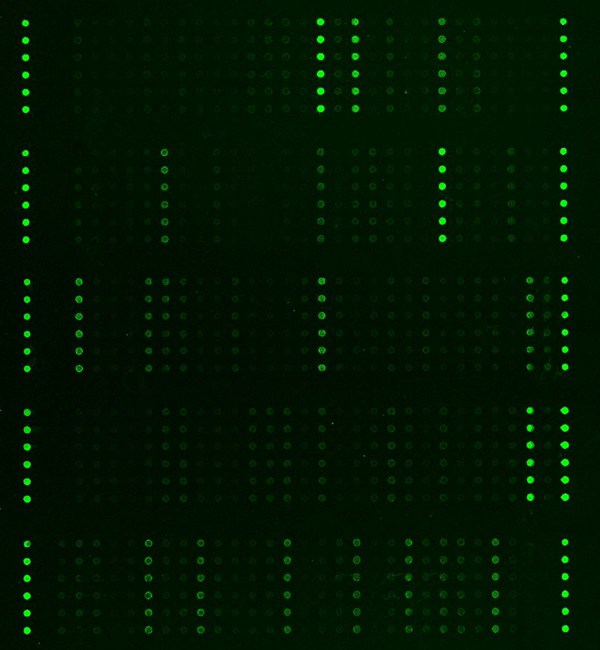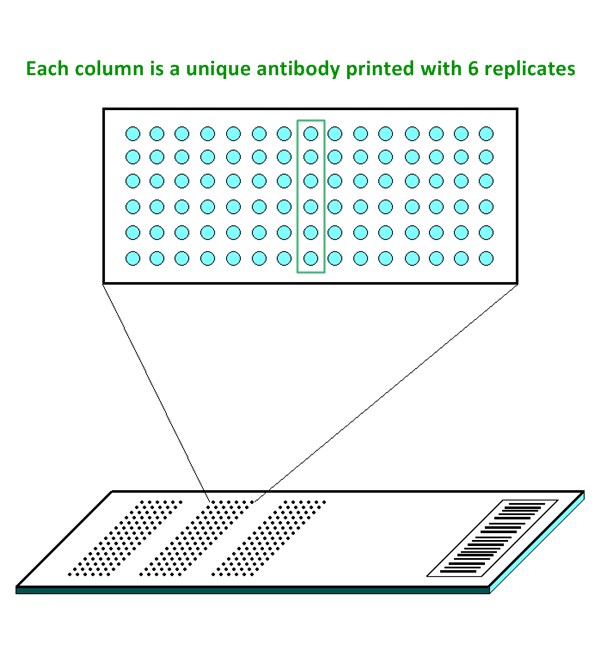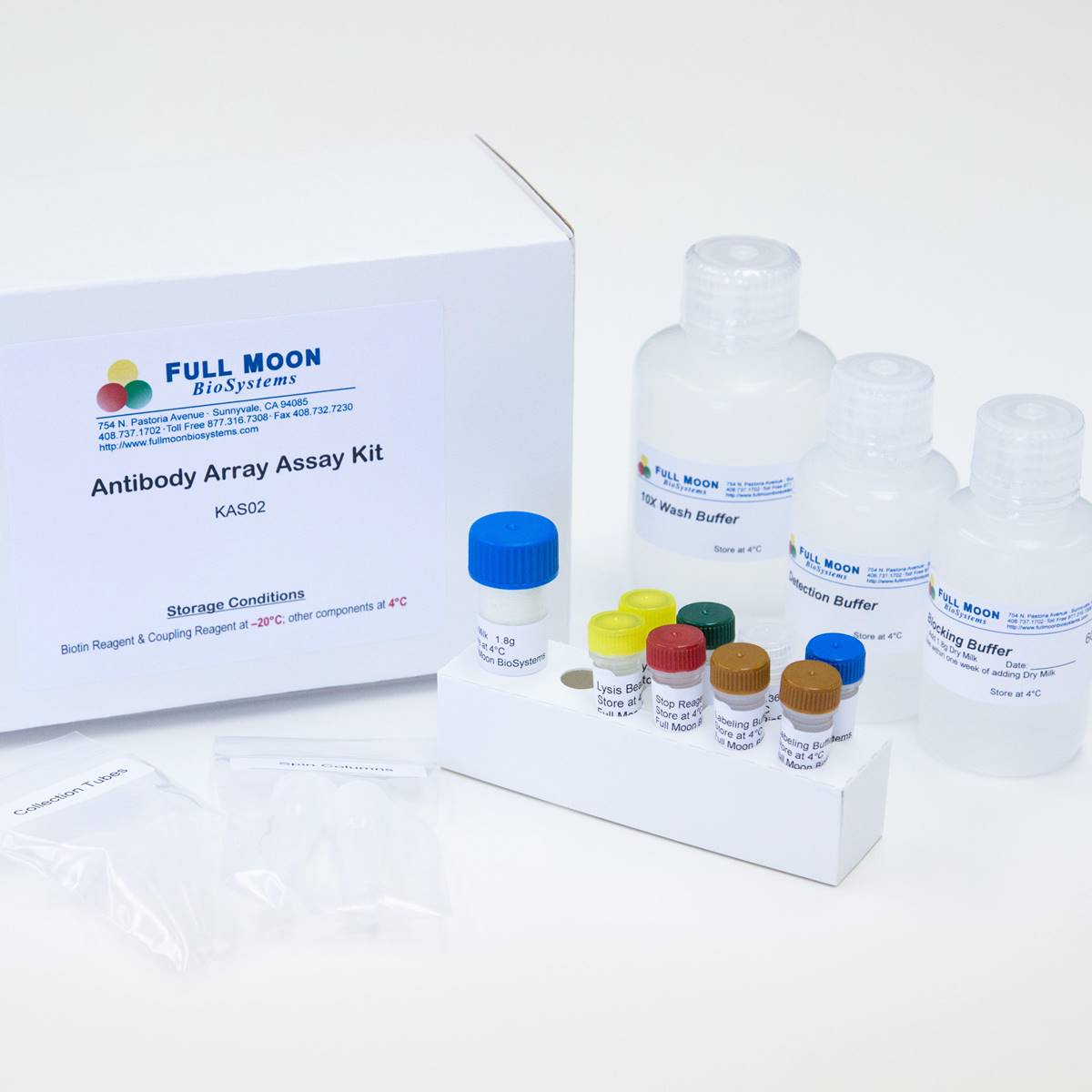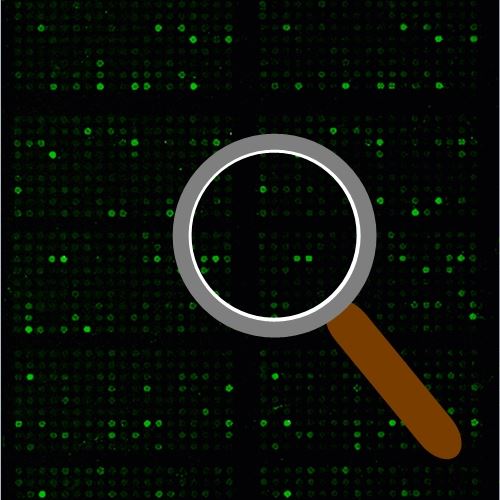VEGF Pathway Phospho Antibody Array
VEGF Pathway Phospho Antibody Array is a high-throughput ELISA based antibody array for qualitative protein phosphorylation profiling. It is suitable for comparing normal samples to treated or diseased samples, and identifying candidate biomarkers. This array features site-specific and phospho-specific antibodies, allowing researchers to study tyrosine phosphorylation and serine/threonine phosphorylation at specific sites.
Key Features
- Site-specific phosphorylation profiling and screening with 185 antibodies
- Antibodies covalently immobilized on 3D polymer coated glass slide
- Fluorescent detection
Specifications
| Product Size: | 2 array slides per package for two samples (untreated vs. treated) |
| Reactivity: | Human: 100% | Mouse: 95% |Rat: 84% |
| Suitable Sample Type: | Cell lysate | Tissue lysate |
| Detection Method: | Fluorescence | Compatible Scanners |
| Internal Controls: | Positive controls: beta-actin | GAPDH | Negative controls |
| Slide dimensions: | 76 x 25 x 1 mm |
| Storage Condition: | 4°C for 6 months |
PRODUCT DETAILS
AKT (Ser473), AKT (Thr308), AKT (Tyr326), AKT1 (Thr450), AKT1 (Thr72), AKT2 (Ser474), BAD (Ser112), BAD (Ser134), BAD (Ser136), BAD (Ser155), BAD (Ser91/128), Casp9 (Ser144), Casp9 (Ser196), Casp9 (Tyr153), c-PLA2 (Ser505), Elk1 (Ser383), Elk1 (Ser389), Elk1 (Thr417), eNOS (Ser1177), eNOS (Ser615), eNOS (Thr495), ERK1/2, ERK3 (Ser189), ERK8 (Thr175/Tyr177), FAK (Ser910), FAK (Tyr397), FAK (Tyr407), FAK (Tyr576), FAK (Tyr861), FAK (Tyr925), FKHR (Ser256), FKHR (Ser319), GRB2 (Ser159), GTPase activating protein (Phopspho-Ser387), HSP27 (Ser15), HSP27 (Ser78), HSP27 (Ser82), HSP90 co-chaperone Cdc37 (Ser13), HSP90A, HSP90B (Ser254), IP3KA, IP3KC, MAPKAPK2 (Ser272), MAPKAPK2 (Thr222), MAPKAPK2 (Thr334), MEK1 (Ser217), MEK1 (Ser221), MEK1 (Ser298), MEK1 (Thr286), MEK1 (Thr291), MEK2 (Thr394), MKK3 (Ser189), MKK3 (Thr222), MKK6 (Ser207), P38 MAPK (Thr180), P38 MAPK (Tyr182), P38 MAPK (Tyr322), p44/42 MAPK (Thr202), p44/42 MAPK (Tyr204), Paxillin (Tyr118), Paxillin (Tyr31), PI3K-p85-a (Tyr607), PI3K-p85-a/g (Tyr467/Tyr199), PKC-a (Tyr657), PKC a/b II (Thr638), PKC-b (Ser661), PKC delta (Ser645), PKC delta (Thr505), PKC epsilon (Ser729), PKC theta (Ser676), PKC theta (Thr538), PKC zeta (Ab-410), PKC zeta (Ab-560), PKC zeta (Thr410), PKC zeta (Thr560), PLC-g1 (Tyr1253), PLC-g1 (Tyr771), PLC-g1 (Tyr783), PLC-g2 (Tyr1217), PLC-g2 (Tyr753), Raf1 (Phospho-Ser621), Raf1 (Ser259), Raf1 (Ser338), Raf1 (Tyr341), RapGEF1 (Tyr504), Ras-GRF1 (Ser916), Shc (Tyr349), Shc (Tyr427), Src (Ser75), Src (Tyr216), Src (Tyr418), Src (Tyr529), VEGFR1 (Tyr1333), VEGFR2 (Tyr1054), VEGFR2 (Tyr1059), VEGFR2 (Tyr1175), VEGFR2 (Tyr1214), VEGFR2 (Tyr951)
The ELISA based VEGF Pathway Phospho Antibody Array platform involves four major steps:
- Protein extraction with non-denaturing lysis buffer
- Biotinylation of protein samples
- Incubation of labeled samples with antibody array
- Detection by dye conjugated streptavidin
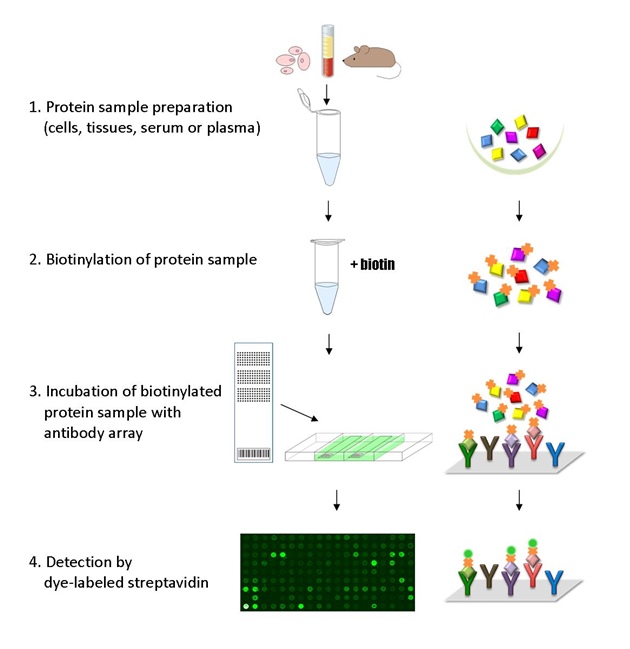
![]() GAL File (To download, right click on the file name, then choose “Save target as”)
GAL File (To download, right click on the file name, then choose “Save target as”)
Giri S, Manivannn J, A proteome-wide systems toxicological approach deciphers the interaction network of chemotherapeutic drugs in the cardiovascular milieu, RSC Adv, 2018, 8:20211-20221
Huang G, Tao L, Hypoxia induced CCL28 promotes angiogenesis in lung adenocarcinoma by targeting CCR3 on endothelial cells. Scientific Reports 6, 27152; doi:10.1038/srep27152
Salinas-Vera YM, Marchat LA, Cooperative multi-targeting of signaling networks by angiomiR-204 inhibits vasculogenic mimicry in breast cancer cells, Cancer Lett, 2018 Jun 6. pii: S0304-3835(18)30399-9
Zhang YM, Dai BL, A novel angiogenesis inhibitor impairs lovo cell survival via targeting against human VEGFR and its signaling pathway of phosphorylation, Cell Death and Disease 2012, 3, e406; doi:10.1038/cddis.2012.145
Zimmerman MW, McQueeney KE, Protein-tyrosine Phosphatase 4A3 (PTP4A3) Promotes Vascular Endothelial Growth Factor Signaling and Enables Endothelial Cell Motility, Journal of Biological Chemistry 289.9 (2014): 5904-5913
ADDITIONAL SERVICES
If you don’t have access to a microarray, send the finished arrays to our lab for scanning. Raw scan images are delivered in tiff format.
Cost: Free
Array Image Quantification and Analysis Service includes data extraction, data organization and analysis of the array images obtained through our array scanning service.
Cost: $200 per slide
Complete Antibody Array Assay Service allows investigators to send research samples to our laboratory for analysis. There is no need to purchase the arrays and reagents and running the assays yourself. Simply select the array of your choice, and then send off the samples to our lab. This convenient hands-off approach offers quick turnaround and reliable results, saving you valuable time and resources. All assays will be performed by our highly trained scientists at our headquarter in Sunnyvale, California. Results are delivered by email in 1-3 weeks.
Cost: $1,470 per sample

